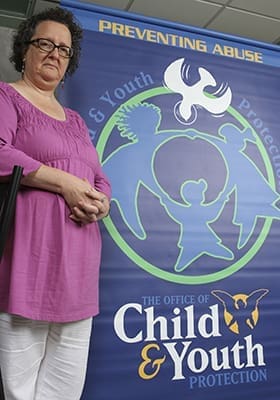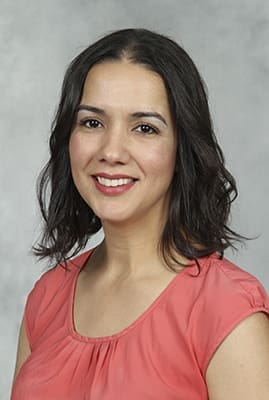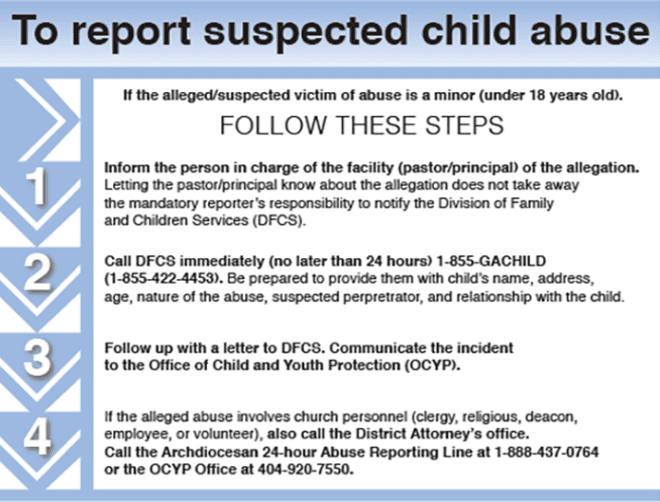Smyrna
Office of Child and Youth Protection seeks to protect, heal
By NICHOLE GOLDEN, Staff Writer | Published September 6, 2018 | En Español
SMYRNA—In the Archdiocese of Atlanta, the Office of Child and Youth Protection concentrates on the daily work of empowering parishes, families and individuals to create and maintain safe environments for the young and vulnerable.
The office (OCYP) includes both the Safe Environment and Victim Assistance programs. Perla Freed is director of safe environment, and Sue Stubbs, MS, NCC, directs victim assistance.

Sue Stubbs has worked in the Archdiocese of Atlanta’s Office of Child and Youth Protection as the director of victim assistance since 2004. Photo By Michael Alexander
Established as Project Aware, the program was formed in 1995 to raise awareness about sexual abuse. Staff members established relationships with community programs, such as the Georgia Council on Child Abuse; developed awareness presentations at parishes; coordinated retreats for adult survivors of abuse; and recruited volunteers and parish liaisons.
In 2001, Project Aware was transformed into the Office of Child and Youth Protection, through which the staff created training programs, developed policies regarding safe environments and oversaw compliance with the Charter for the Protection of Children and Young People spearheaded in 2002 by the U.S. Conference of Catholic Bishops (USCCB).
Freed and Stubbs recently spoke about the ministry of child and youth protection and what propels them forward following the recent news that hundreds of incidences of child sex abuse occurred in Pennsylvania dioceses over numerous decades.
“Promise to protect”
Joining the OCYP five years ago, Freed said their work is summarized by the USCCB Charter, “The Promise to Protect, Pledge to Heal.”
“It’s the promise to protect when it comes to all the prevention—everything we do prior to anybody having access to children, young people and vulnerable adults,” explained Freed. “And then Sue’s ministry, the pledge to heal. So anybody who’s been hurt, harmed in any way by a Catholic church representative, we have all kinds of services available to victims of abuse.”
The Safe Environment program arms parents, volunteers and children with information provided through VIRTUS training. This program also ensures background screenings of clergy, employees and adult volunteers and has implemented policies including a code of conduct, ministerial standards and a social media policy.
VIRTUS “Protecting God’s Children” is a mandatory three-hour training for all who work with children and youth. The training covers the five basic steps of child abuse prevention from knowing warning signs of a potential perpetrator’s behavior to communicating concerns.
Age-appropriate VIRTUS training is offered yearly to children, teaching them body safety, including personal boundaries, and steps to ensure their own safety.
According to VIRTUS materials, one of every five adult women and one of every 10 adult men say they were molested as children, underscoring the need for awareness.
Diocesan-wide, VIRTUS replaced “You Matter,” a one-hour, self-generated video, in 2016.
“We’ve gotten a little pushback from people because of the three-hour commitment,” said Freed. “It’s a three-hour sacrifice, but I think the facilitators have been well trained on acknowledging the sacrifice of time that our volunteers, and parents and employees are doing.”
Freed said the idea behind VIRTUS is that everyone must be part of the solution to preventing abuse.
Thorough, consistent training
Volunteer facilitators lead trainings, which include videos and discussions about warning signs, controlling access to children, monitoring of programs, paying attention to behavior changes in children and reporting signs or suspicions of abuse. They are thoroughly trained to handle any question that might arise.

Perla Freed
Photo By Michael Alexander
“This is just a good start for all of us to have the same information and we all know the same thing,” said Freed.
Stubbs, who has worked with victims of abuse for 25 years, gets the impression from those who complete VIRTUS that it’s worth the time.
“They come in thinking it’s a sacrifice, but after they leave, they think it’s a gift,” she said.
Since requiring VIRTUS, Freed has seen changes in trends including more concerns about personal boundary violations.
“It’s the way to move really to the promise to protect,” she explained. “It’s not getting to the point where an incident happens or a suspicion of abuse, but (it’s) that behavior of an adult that is inappropriate towards a child and somebody being able to say it, observe it and report it on time before that person does it again.”
Freed said the warning signs are there and gave an example of an adult who always wants to be alone with children.
“People know it’s not appropriate to have an adult alone with a child,” she said.
If a volunteer exhibits that tendency, it’s a red flag.
“Either that person has not completed VIRTUS, or they’re really disrespecting the rules,” said Freed.
Most volunteers or clergy would not put themselves in that situation.
“And if they do, that’s a sign they think they’re above the rules,” said Stubbs.
VIRTUS is used in more than 120 dioceses. Freed became certified in 2015 to train Atlanta’s facilitators so that knowledge imparted to participants is consistent throughout the archdiocese.
The archdiocese has 150 facilitators to offer VIRTUS in Spanish and English. There are two Korean and Vietnamese language facilitators.
Sterling Backcheck conducts background screenings for clergy, employees and volunteers every five years. Criminal background checks and using standard employment and volunteer applications as well as checking employment references are messages to potential abusers that the church is alert.
VIRTUS trainings, background screenings and clear policies have helped bring cases down significantly since implementation of the USCCB charter.
“And I think that it has worked. We can prove it,” said Freed.
Fewer confirmed reports nationwide at parishes and schools are “signifying the fact that children are being empowered and told what to do in case something does happen … and parents, too so that the adults and volunteers are more willing to report as well,” she said.
Adults are more willing to report signs, yet that does not mean abuse is happening more, noted Freed.
“It means that now they have the resources to know what to do, where to go and how to do it and they’ll have a backup system not only at the parish and school level but we are here. Our office is here in case they need any assistance in the reporting part,” she said.
Mandatory reporting with reasonable cause
Communicating concerns is difficult but also the most important step in preventing abuse.
“By law, at least in Georgia, everyone who works at the church is a mandatory reporter,” reminded Freed. The time frame for reporting abuse changed to 24 hours in 2012. Any mandated reporter with reasonable cause to believe abuse has occurred has 24 hours to call the Georgia Division Family and Children Services.
The law covers physical and sexual abuse as well as negligence, exploitation or exposure to pornography.
Many times, those who contact the Safe Environment program have questions or concerns about warning signs versus abuse suspicions.
Warning signs, also called boundary violations, should be communicated to a pastor or principal. A suspicion of abuse is reportable to authorities.
As discussed during VIRTUS sessions for adults, knowing the warning signs helps adults recognize the early signs of an inappropriate relationship between an adult and a minor.
Some signs of being a potential abuser are individuals who discourage other adults from participating or monitoring, one who is more excited to be with children than adults, an individual who gives gifts to children without permission, wants to wrestle or tickle children, uses bad language or tells dirty jokes or takes photos without approval.
If a child tells an abuse account to an adult or someone close to a victim reports abuse, that’s when mandatory reporters are required to report to DFCS at 1-855-GACHILD. The report should also be made immediately to the supervisor of the parish or school.
If the allegation involves a member of the clergy, employee, or volunteer of the archdiocese, contact the Office of Child and Youth Protection during business hours or the archdiocesan 24-hour Abuse Reporting line at 1-888-437-0764.
If an adult discloses they were sexually abused as a minor and the abuser was a representative of the Church, they can also call the OCYP office (during business hours) or the Abuse Reporting Line.
“If you’re in doubt, report,” is the message Stubbs has on her voicemail. “Better safe than sorry because the repercussions on the victim’s side and the reporter’s side are steep. When they first changed the reporting law to 24 hours, they put some people in jail for waiting too long.”
Freed said reports to DFCS are anonymous and not disclosed in investigations.
DFCS maintains a registry of claims substantiated, which is a good resource for church officials.

Healing programs available to victims
Victim Assistance offers outreach and healing programs for those abused by church personnel. This office organizes a pastoral response to the victim, their family and their parish by offering resources for counseling, spiritual direction, prayer services, retreats and education. Some programs are extended beyond those abused by church personnel to include all abuse victims. The office supports victims of church personnel abuse during investigations and works as their advocate with the Archbishop’s Advisory Board, as well as coordinating the training for clergy and staff to respond to victims of abuse.
The Way: A Healing Retreat for Survivors of Abuse is a three-day meditation and prayer program crafted around the Stations of the Cross. The next Way for Women will be Dec. 7-9, and the Way for Men will be held Sept. 14-16.
The trauma recovery group teaches survivors of trauma how to improve their day-to-day functioning and how to live effectively in the present. Trauma groups have been meeting at various parishes since 2010, and a group will begin meeting Oct. 3 at Holy Spirit Church, Atlanta
Prayer services and Masses of healing are also held in the archdiocese for victims, and several churches have “Cry to Heaven,” a program of prayer by rosary groups at parishes.
Victim response training includes workshops for clergy in ministering to victims and programs for lay ministers and mental health professionals.
Stubbs responds to adult survivors, regardless of where the abuse occurred. They can attend local retreats and she also helps them connect with the diocese where the abuse happened, acting as their liaison.
Stubbs holds a master’s degree in counseling and is a national certified counselor. She has served the archdiocese for 15 years.
“I personally believe, really, that this is where God wanted me, and he’s given me the grace to do it,” she said.
Stubbs said there are things that bother her, but she has never wanted to turn from her faith.
“It’s a human problem,” she said about the prevalence of abuse.
Abuse is going to occur in church, which is made up of humans, and someone needs to do the work of helping victims and raising awareness.
Like her brother, who is a first responder, Stubbs feels called to do the work.
“He’s a firefighter. I could never do that job, but somebody has to. He’s given the grace to do it. It’s a hard thing to do—to run into a fire and save somebody,” she said.
Freed joined the OCYP the year she became a parent, having worked previously in finance for the archdiocese.
“The more and more I got involved with it, I wanted to learn more about it and wanted to see other ways to help,” she said.
She and Stubbs support one another in their efforts.
“I think it helps to have a colleague within these walls that you can talk without putting any filters on,” said Freed. “The USCCB staff has done a fantastic job of pulling us all together and keeping us realizing that we have a mission.”
A national conference brings all the offices of child protection of dioceses, large and small, together each year.
“Just to be together that one time a year is hugely helpful,” said Stubbs.
The Way: A Healing Retreat for Survivors of Abuse is a three-day meditation and prayer program crafted around the Stations of the Cross. The next Way for Women will be Dec. 7-9, and the Way for Men will be held Sept. 14-16.